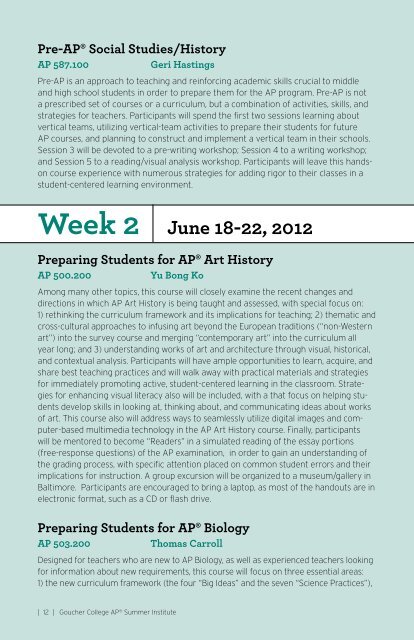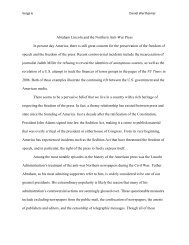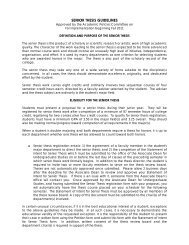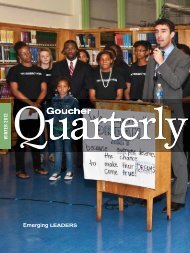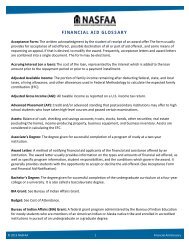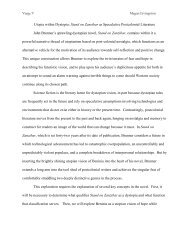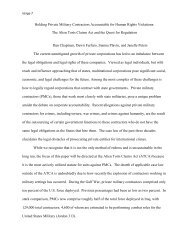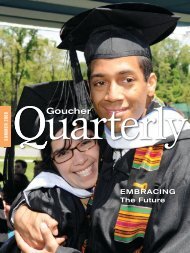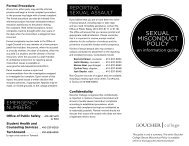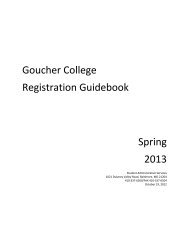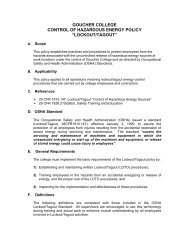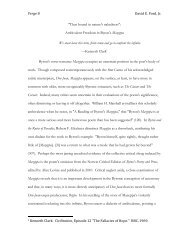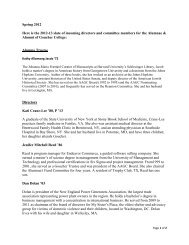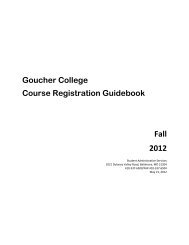AP® Summer InStItute - Goucher College
AP® Summer InStItute - Goucher College
AP® Summer InStItute - Goucher College
Create successful ePaper yourself
Turn your PDF publications into a flip-book with our unique Google optimized e-Paper software.
Pre-<strong>AP®</strong> Social Studies/History<br />
AP 587.100<br />
Geri Hastings<br />
Pre-AP is an approach to teaching and reinforcing academic skills crucial to middle<br />
and high school students in order to prepare them for the AP program. Pre-AP is not<br />
a prescribed set of courses or a curriculum, but a combination of activities, skills, and<br />
strategies for teachers. Participants will spend the first two sessions learning about<br />
vertical teams, utilizing vertical-team activities to prepare their students for future<br />
AP courses, and planning to construct and implement a vertical team in their schools.<br />
Session 3 will be devoted to a pre-writing workshop; Session 4 to a writing workshop;<br />
and Session 5 to a reading/visual analysis workshop. Participants will leave this handson<br />
course experience with numerous strategies for adding rigor to their classes in a<br />
student-centered learning environment.<br />
Week 2 June 18-22, 2012<br />
Preparing Students for <strong>AP®</strong> Art History<br />
AP 500.200<br />
Yu Bong Ko<br />
Among many other topics, this course will closely examine the recent changes and<br />
directions in which AP Art History is being taught and assessed, with special focus on:<br />
1) rethinking the curriculum framework and its implications for teaching; 2) thematic and<br />
cross-cultural approaches to infusing art beyond the European traditions (“non-Western<br />
art”) into the survey course and merging “contemporary art” into the curriculum all<br />
year long; and 3) understanding works of art and architecture through visual, historical,<br />
and contextual analysis. Participants will have ample opportunities to learn, acquire, and<br />
share best teaching practices and will walk away with practical materials and strategies<br />
for immediately promoting active, student-centered learning in the classroom. Strategies<br />
for enhancing visual literacy also will be included, with a that focus on helping students<br />
develop skills in looking at, thinking about, and communicating ideas about works<br />
of art. This course also will address ways to seamlessly utilize digital images and computer-based<br />
multimedia technology in the AP Art History course. Finally, participants<br />
will be mentored to become “Readers” in a simulated reading of the essay portions<br />
(free-response questions) of the AP examination, in order to gain an understanding of<br />
the grading process, with specific attention placed on common student errors and their<br />
implications for instruction. A group excursion will be organized to a museum/gallery in<br />
Baltimore. Participants are encouraged to bring a laptop, as most of the handouts are in<br />
electronic format, such as a CD or flash drive.<br />
Preparing Students for <strong>AP®</strong> Biology<br />
AP 503.200<br />
thomas Carroll<br />
Designed for teachers who are new to AP Biology, as well as experienced teachers looking<br />
for information about new requirements, this course will focus on three essential areas:<br />
1) the new curriculum framework (the four “Big Ideas” and the seven “Science Practices”),<br />
2) the new inquiry-based lab approach, and 3) the new exam. During the week, participants<br />
will develop a course syllabus based on the new curriculum standards and will work<br />
cooperatively with other teachers to share teaching strategies and activities. Participants<br />
will engage in extensive hands-on experiences with the new inquiry-based labs. Participants<br />
also will discuss ways to modify existing labs to fit the new AP Biology Science Practice<br />
Standards. The new exam design will be highlighted, particularly in contrast with the<br />
former exam. Other topics for the week include the audit process, textbooks, networking,<br />
and biotechnology labs. Participants will be expected to read the new AP Biology curriculum<br />
before the workshop begins and to share a “best practice” lesson during the week. All<br />
laboratory equipment and materials will be provided.<br />
Preparing Students for <strong>AP®</strong> Calculus AB<br />
AP 506.200<br />
Jim Bohan<br />
This course will focus in detail on the philosophy, content, and pedagogies related to creating<br />
and implementing a successful course in AP Calculus AB. The sessions will engage<br />
students in the four main areas of AP Calculus AB: functions, limits and graphs; derivatives;<br />
and integrals. The approach will be one of using actual AP Calculus AB problems<br />
to guide the discussion of content and pedagogy. In addition, the course will provide<br />
opportunities for discussion about topics such as course goals, objectives, content, resources,<br />
bibliographies, and equipment; the AP exam development and grading process;<br />
syllabi, lesson plans, and assignments; how to refresh and improve existing AP courses;<br />
recent changes in AP course descriptions; strategies for teaching students at beginning<br />
or intermediate levels; vertical teaming; and the use of technology in AP Calculus AB.<br />
Participants will be expected to collaborate and participate fully in the proceedings of<br />
the course and will be encouraged to create a network of support.<br />
Preparing Students for <strong>AP®</strong> Chemistry—New Teachers<br />
AP 513.200<br />
John Hnatow, Jr.<br />
Recommended for teachers who have three years or fewer of AP Chemistry teaching<br />
experience, This course will use the most current exam information to provide an<br />
overview of the AP Chemistry curriculum content and give teachers both theoretical<br />
background and hands-on experiences to help them design their own courses. Through<br />
group activities and homework, participants will solve text and AP exam problems to<br />
review the basic concepts of a college-level chemistry course, including stoichiometry,<br />
the structure of matter, net-ionic equations, colligative properties, solutions, inter vs.<br />
intra-molecular forces, periodic properties, kinetic theory of gases, chemical equilibria,<br />
chemical kinetics, and basic principles of thermodynamics. Emphasis will be placed on<br />
the structure and grading of the AP exam. Participants also will focus on teaching strategies<br />
and techniques for student success. Selected activities will engage participants in<br />
learning about the new AP Chemistry curriculum framework—the big ideas and enduring<br />
understandings, the science practices, and experiences with inquiry activities. Participants<br />
will perform several of the requisite laboratory experiments necessary for student<br />
success. This course ultimately is intended to inspire teachers to motivate their students<br />
to achieve at the highest possible levels. There will be about two hours of homework<br />
daily.<br />
| 12 | <strong>Goucher</strong> <strong>College</strong> AP ® <strong>Summer</strong> Institute Week 2 Courses | 13 |


